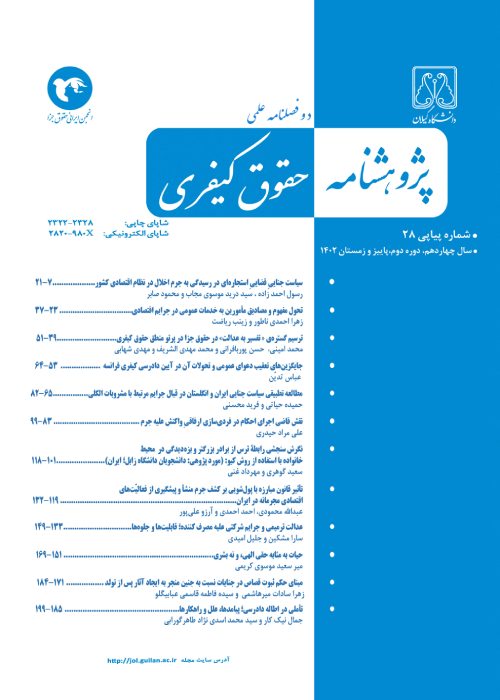Review in corporal punishments in the light of re-reading the rule of coexistence of Reason and Sharia
The meaning of the Mulazemah rule is the overlapping of reasoning and Sharia. That is, whatever the intellect approves of it can also be enforced by the Sharia, and whatever the Sharia accepts, the intellect also supports it. The present research is based on the descriptive-analytical method and relies on the recent reality in the effort to legitimize the transition from violent criminal punishment, a goal that is achieved through deliberation in the discussed base. In this regard, the authors have come to the conclusion that the human mind of today, which can be found in international human rights documents, does not tolerate corporal punishment. Therefore, since based on the discussed rule, the intellectual findings are considered as Sharia rules, then such human rights achievements should be paid attention to. On the other hand, the Sharia is also compatible with reasoning and intellect .In this sense, in order to objectify what has been just stated , the jurisprudence rulings must be reread in the light of the purposes of the Sharia, because the purposes of the Sharia (life, reason, dignity, fairness, justice, etc.) are fixed, but human understanding of these concepts is dynamic and current. Therefore, it must be paid attention to what the intellectual perceptions of each generation is in the mentioned concepts. In that sense, today, the rulings that are considered contrary to reasoning and intellect are invalid according to Sharia law. This solution makes Sharia equal to reason and provides the needs and necessities of today's society. As a result, it is possible to revise the implementation of corporal punishment under the shadow of the discussed rule.
Among the most prominent approaches in Iran's criminal policy in the last four decades, there has been the use of corporal punishments in the Islamic penal laws, which have been appeared in the form of Hudud, Qisas and Ta’azirat. In this regard, it seems that the idea of their immortality, which is imprinted in the legislator's mind, was one of the most important proofs of immunity from the abolition of these reactions, especially the Hudud and Qisas, during the time. However, the mentioned thought has been associated with numerous philosophical and sociological challenges in these years, both international and national wise. Therefore, such punishments have been criticized from different inner-religious perspectives and also outer-religious perspectives. The current research is also in line with the introduction and expansion of the recent discussion, that is, the criticism of torturous punishments, in an effort to reread a rule that is referred to as "Mulazemah" or "Talazom" in jurisprudence and principles sources. In the works of the predecessors, no independent work can be found regarding the connection of the mentioned rule with the field of punishments. Therefore, the current article is in search of rereading and extending it to this area. Therefore, the most important question of the current research is how to overcome corporal punishment by relying on the principle of Mulazemah.
This research has been written using the descriptive-analytical method and with the approach of documentarystudies.
1- Corporal punishments are incompatible with the principles of the contemporary world, including human rights, so international organizations react to how it has been implementing in Islamic countries, including Iran. Also, such punishments have significant consequences for the Islamic society, including the generating of violence. Also, based on the available statistics, the mentioned punishments have not been able to reduce or even control crimes in the society.
2- Islamic Sharia is legible, so it is possible to present a human right reading of it, at least in the discussion of punishments. In this regard, one of the ways of harmonizing Islamic laws and regulations with the rules and principles of human rights is to pay attention to the principle of Mulazemah.
3- The theme of the Mulazemah rule is the overlapping of reasoning and Sharia. That is, whatever the intellect approves is also enforced by the Sharia, and whatever the Sharia accepts, the intellect also supports it.
4- Reasoning and intellect is one of the four arguments and one of the sources of inference in Islamic law.
5- Intellect is a living and dynamic entity that can have different achievements over time. One of today's intellectual achievements is human rights. In this regard, it is not necessary for contemporary mankind to rely on the intellectual findings of ten centuries ago.
6- Islamic law is interpretable. Giving meaning to the recent reality is possible through the interpretation of the rules of Islam in the light of the purposes of Sharia. Due to the fact that only in this way it is possible to meet the needs of every age.
7- Examples of the purposes of the Sharia such as justice, dignity, fairness, etc., are consistent in terms of vocabulary, however the concept and perception of each era can be different from another. Therefore, one should pay attention to the perception of each era of a concept. This solution makes Sharia equal to reasoning and provides the needs and necessities of today's society.
As a result, it can be said that today’s traditional reading of the rule of Mulazemah has blocked the possibility of using it, because the premise is that the series of rulings that came from the past eras have reached the hands of today's mankind. In any case, it is equal to reason, and therefore, if man's reason and intellect does not accept a rule in the current days, it is a problem with his understanding. That is, if a rule is written or signed by the Shariah, this ruling is definitely equal to reason, even if he does not understand it at the time. Therefore, a rule such as whipping s is both in accordance with Sharia and in accordance with reason in all times and places.
The writers of these lines believe in the equality of reason and law and the infallibility of this claim, but they have another interpretation of reason and law; A dynamic commentary that affirms the immortality of "the compatibility of reason and Sharia, as well as Sharia and reason". From the point of view of the authors, the meaning of reason in this rule cannot always be the human reasoning and intellect in the age of descent. In other words, although the rulings established or signed were without a doubt equal to the human intellect of that time, but in the sense of closing the case, the rulings are not particularly ungodly like punishments. Therefore, if today’s human intellect does not confirm a ruling, we should not pass this intellectual achievement simply and without reflection. The same event that happened regarding corporal punishments and the human mind does not reflect it today. The proof of the recent claim are the provisions of various human rights documents, in which the last will of the present man is manifested, and today it can be referred to as "Sira Oqala”. Most countries in the world include such considerations in their domestic laws; Because the violation of such rules is associated with the reactions and punitive actions of other actors in the international arena. Therefore, although a topic like human rights in today's sense has never been discussed in the past, but as some jurists have stated, its appearance in today's world cannot be a proof of its invalidity, but can be an example, rather, it can be an example of the reason mentioned in the rule of Mulazemah.
Regarding Sharia, we also believe that in order to recognize Sharia rulings, one must pay attention to the purposes of Sharia law and recognize Sharia rulings in the light of that. The purposes of Sharia include self, religion, reason, justice, human dignity, and anything alike those, which must be included in their criteria to determine whether a ruling can fall under the category of Sharia. For example, in order to determine that a punishment such as stoning is in the category of Shariah, we must weigh it with human dignity, as one of the supreme goals of Shariah. It should be kept in mind that the mentioned purposes are fixed, but human understanding of them is variable. In this way, human perceptions of a word are changeable over time. For example, in the past, a punishment such as taking life was not a violation of human dignity so that its followers would ignore the purposes of the Sharia, but today's intellect does not consider it to a significant extent as an intellectual. Therefore, against the purposes of Sharia, criminal reactions can be considered as historical rulings and appropriate to previous societies. Therefore, it is possible to leave aside the jurisprudence rulings that are contrary to the current state of affairs and, relying on the purposes of the Sharia, reread the texts according to the current time and place. Through such an interpretation, it is possible to consider reasoning with Sharia and Sharia with reasoning. The conclusion is that the alignment of reason and Sharia makes the transition from corporal punishment in today's world possible, so the Islamic legislator should come up with a new reading of the discussed rule in the effort of rethinking the ruling penal policy.
- حق عضویت دریافتی صرف حمایت از نشریات عضو و نگهداری، تکمیل و توسعه مگیران میشود.
- پرداخت حق اشتراک و دانلود مقالات اجازه بازنشر آن در سایر رسانههای چاپی و دیجیتال را به کاربر نمیدهد.




